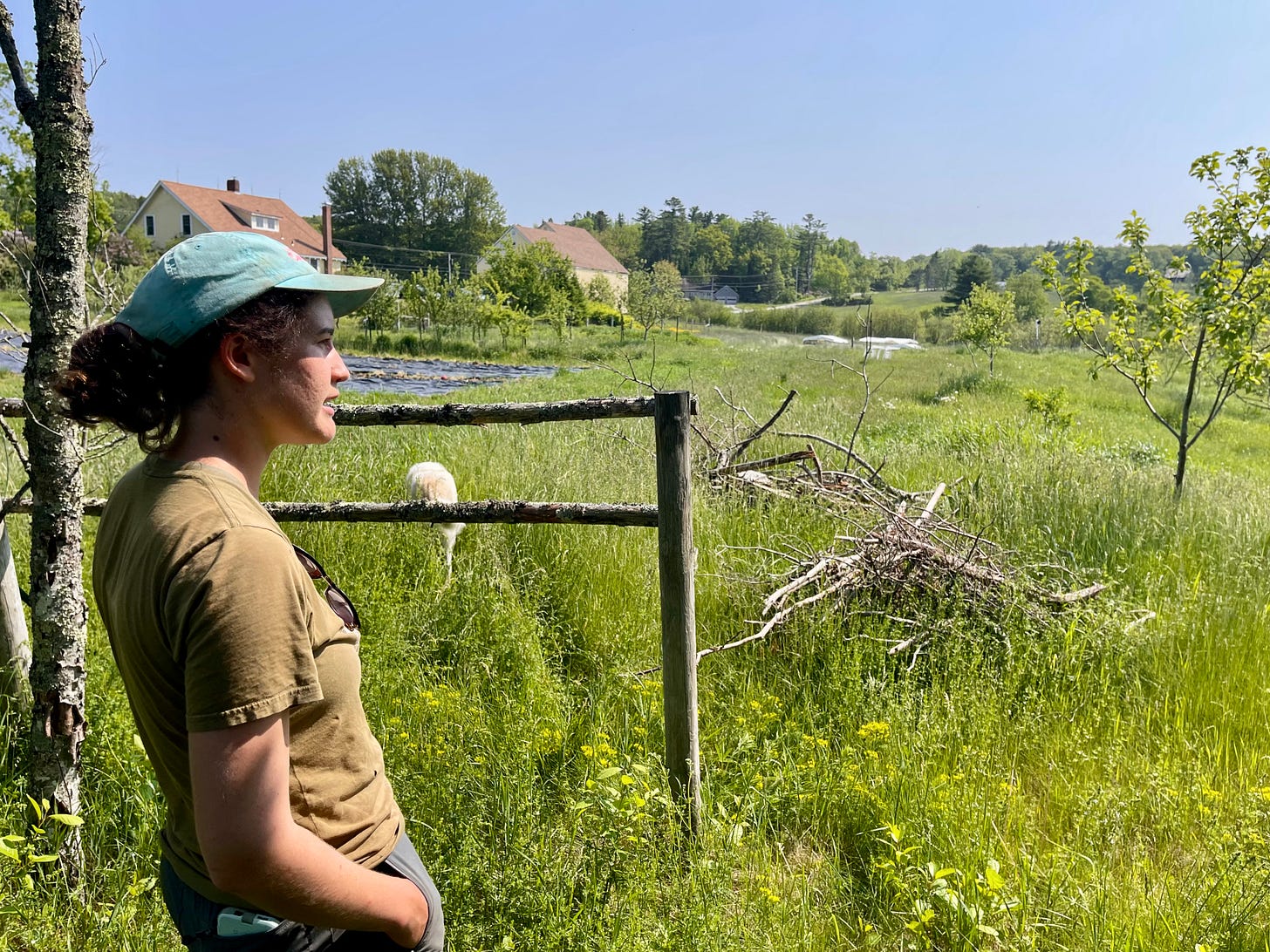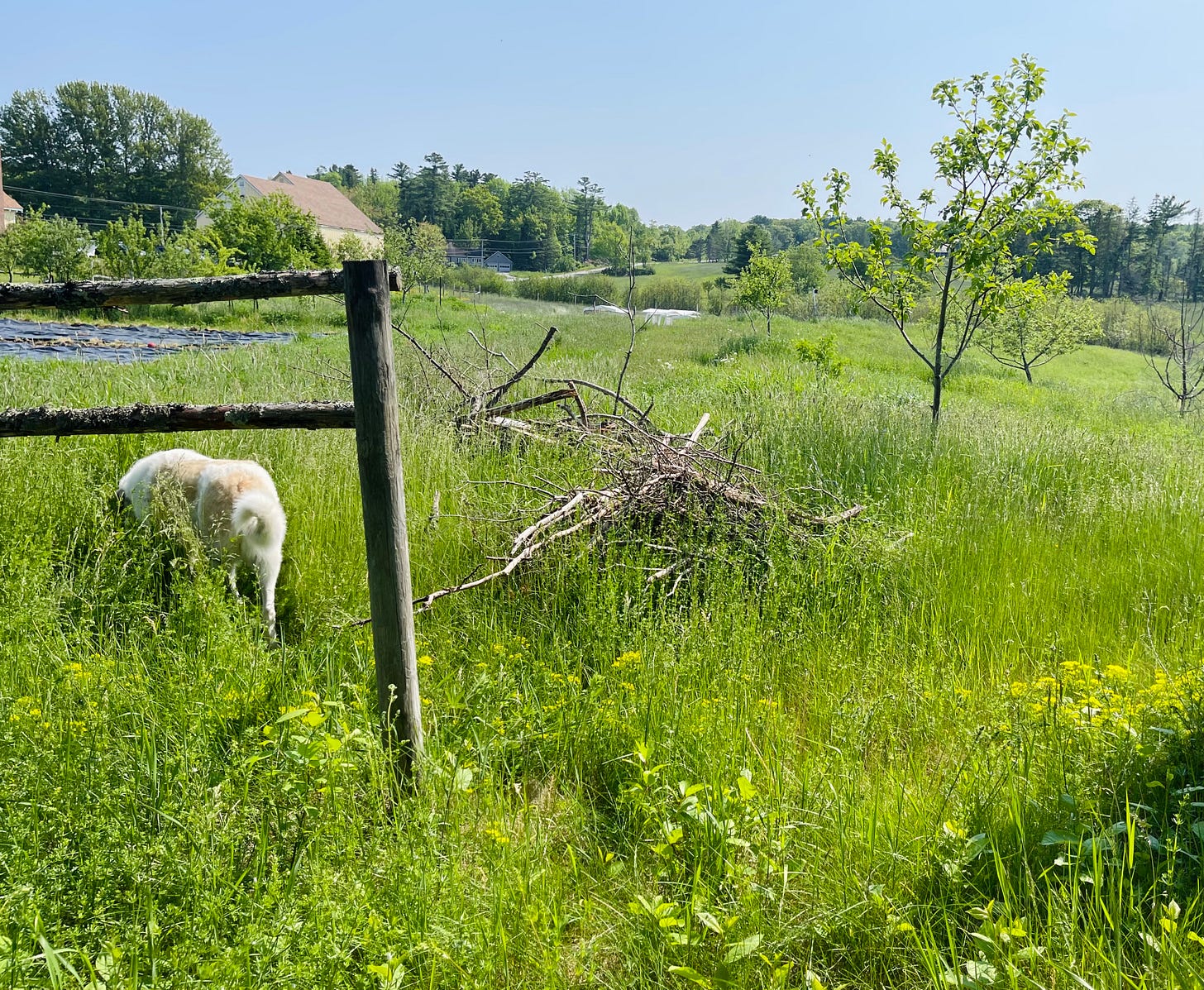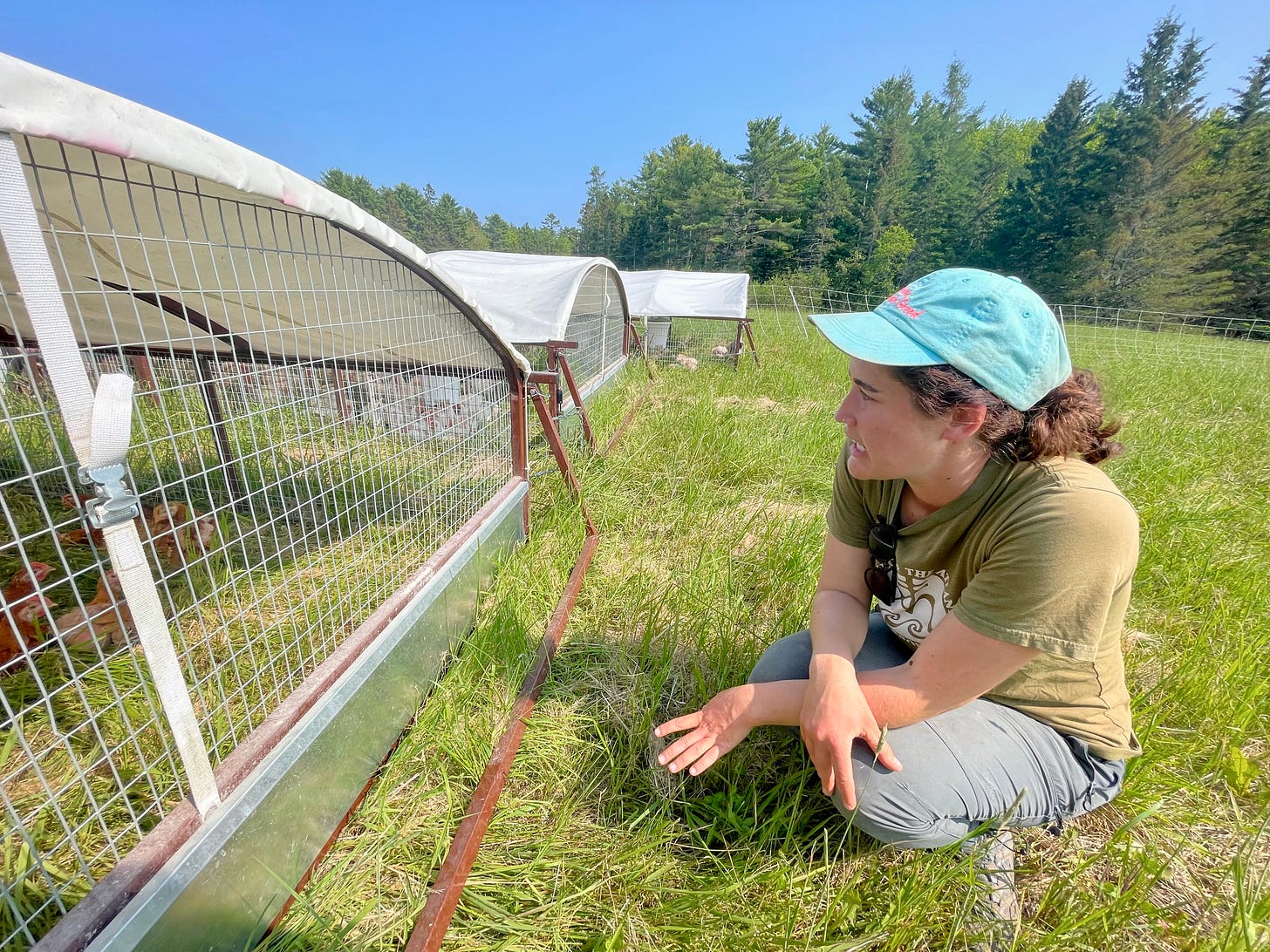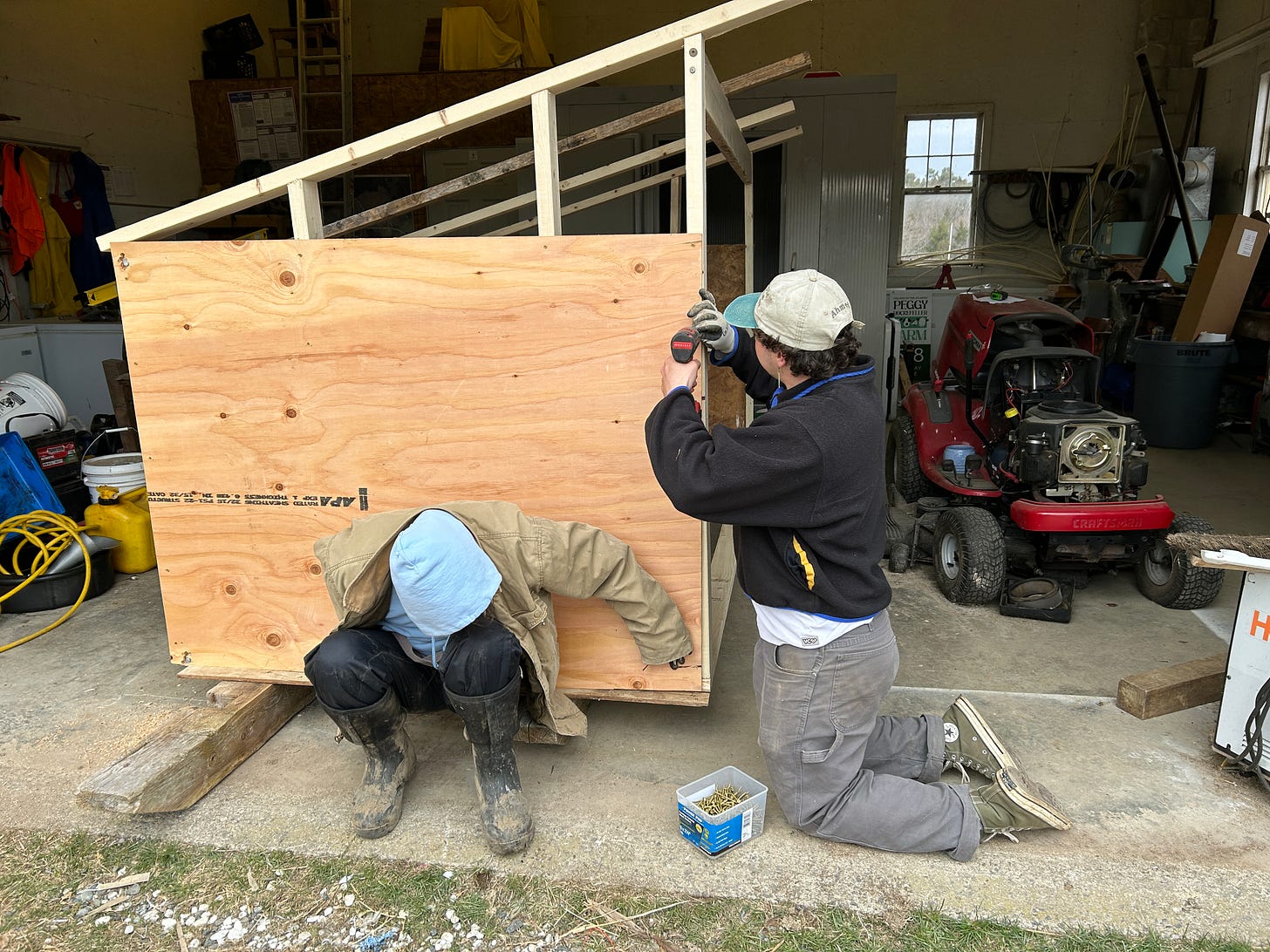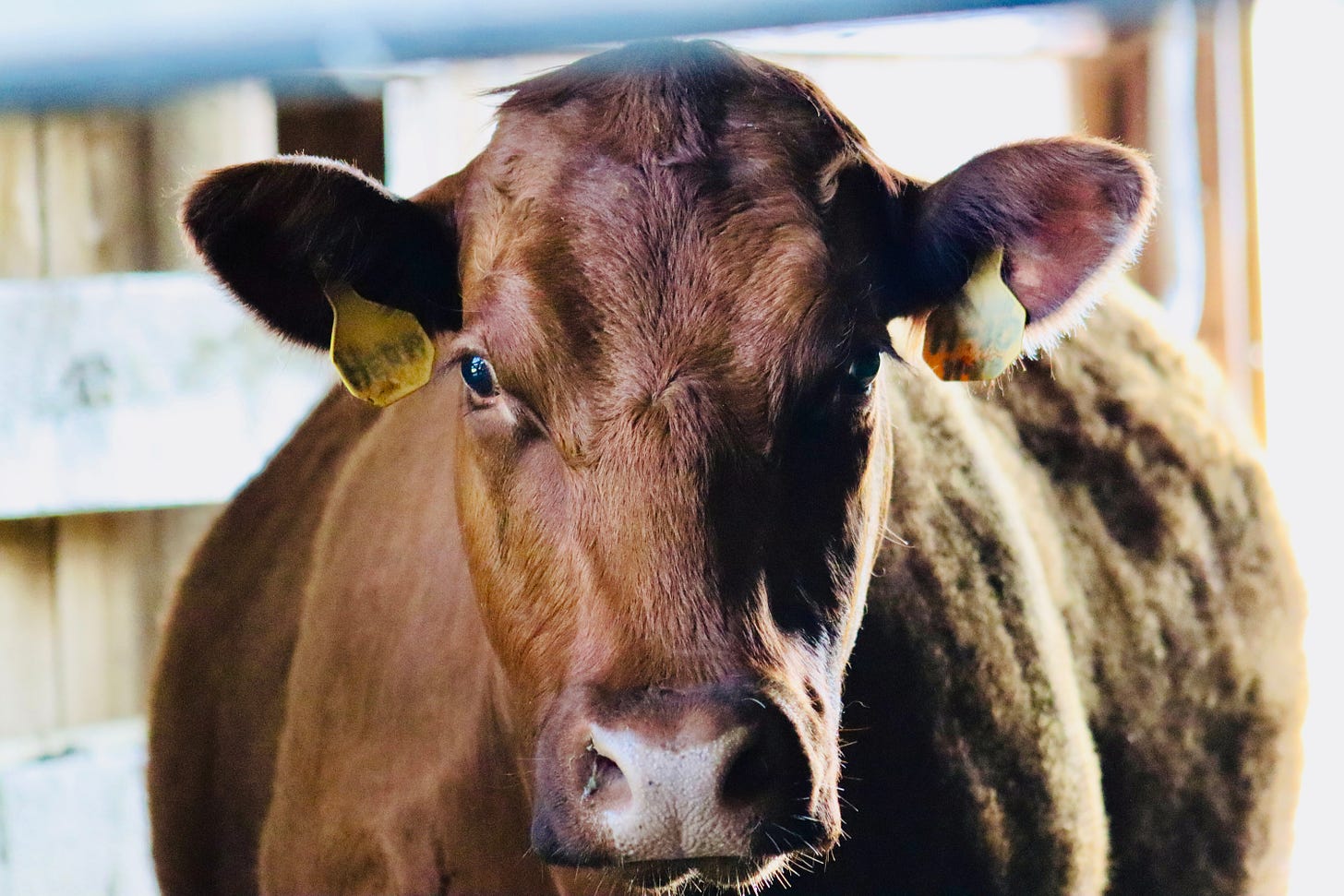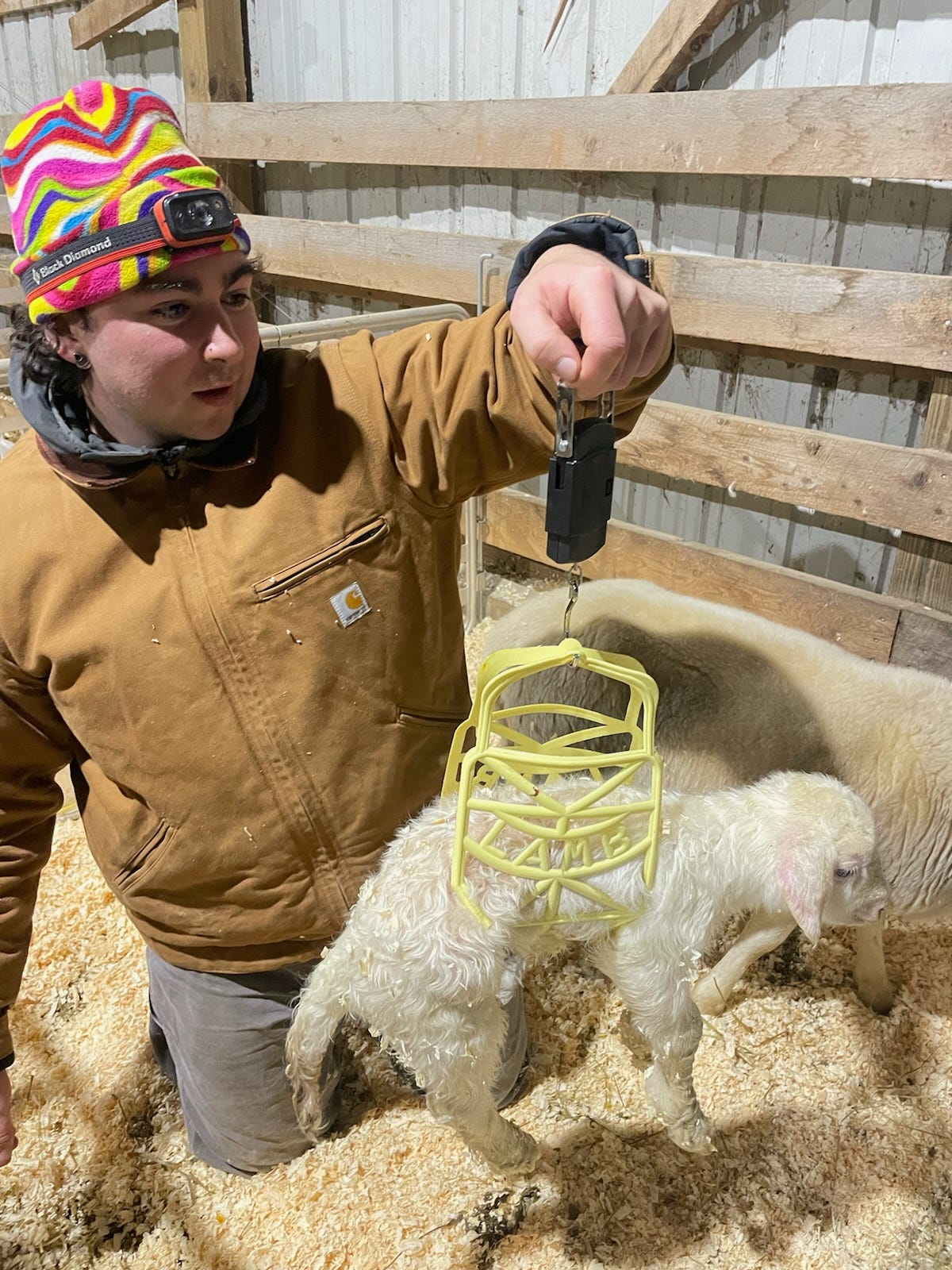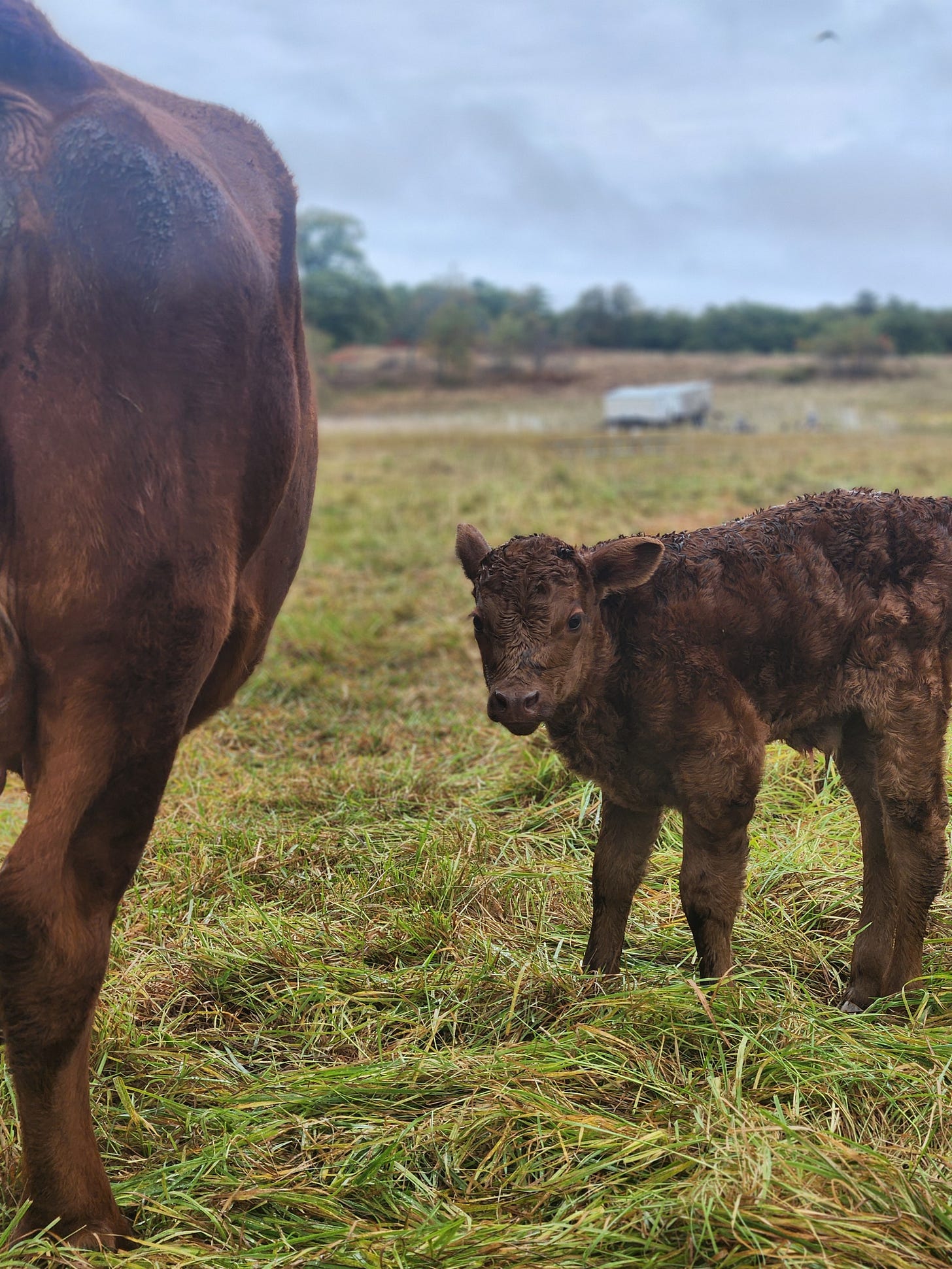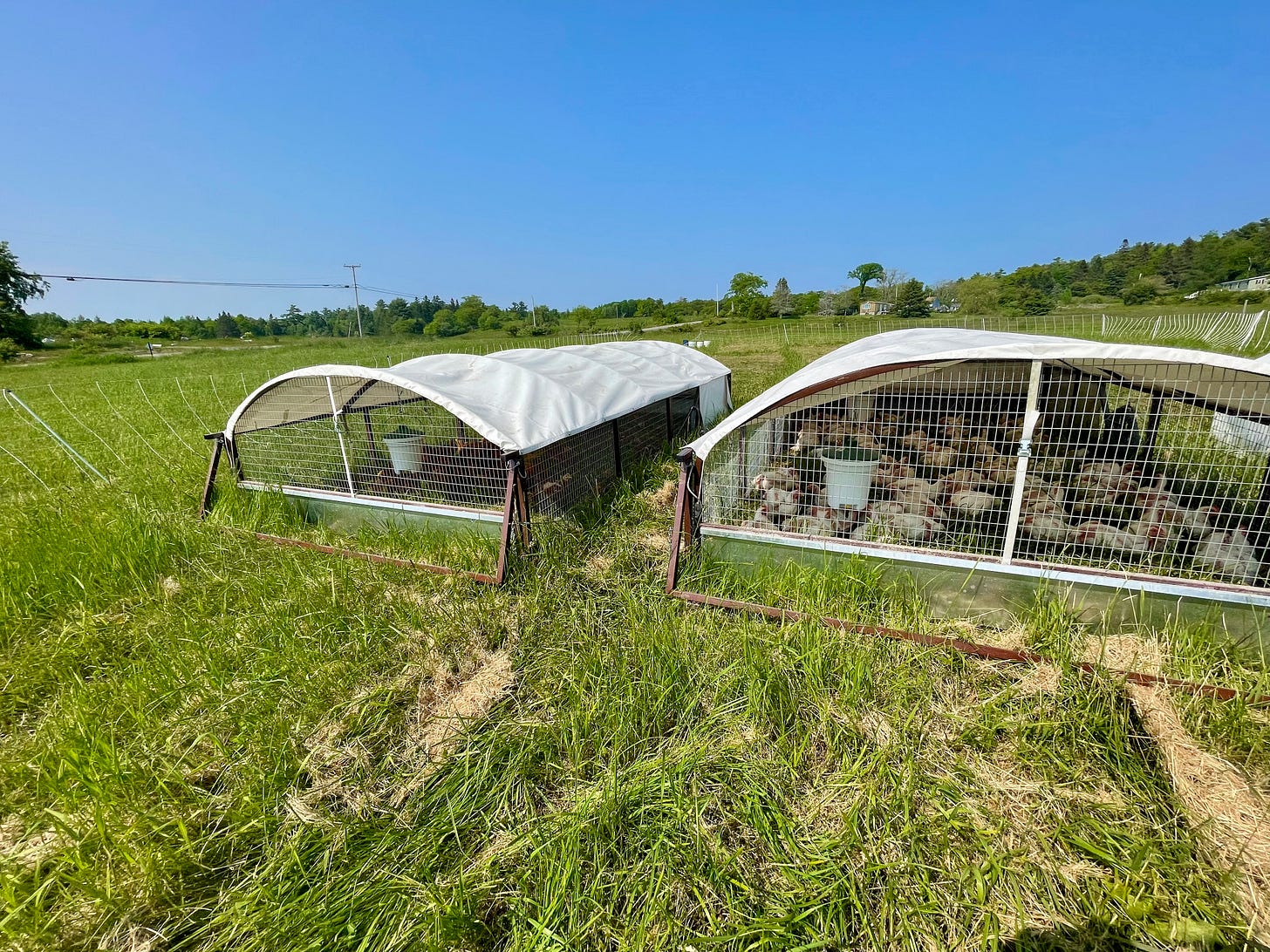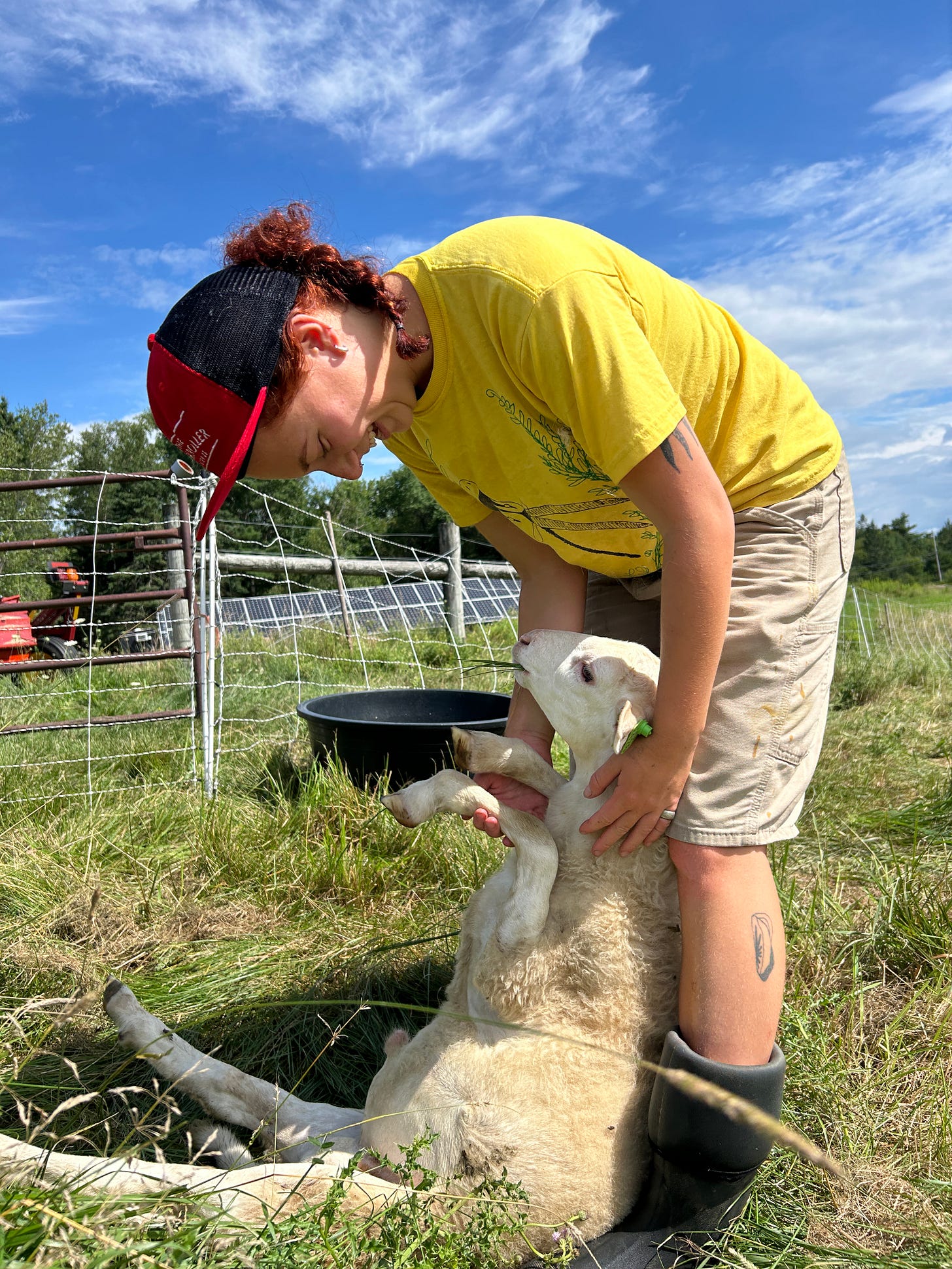Where Conservation Meets Community: The Continuing Story of the Peggy Rockefeller Farm
And how you can be part of that community, too.
The Bar Harbor Story is generously sponsored by Swan Agency Real Estate.
BAR HARBOR—The large white dog bounded up from the field underneath a clear Maine early summer sky, wagging her tail and punctuating the air with an occasional bark.
“She acts like she owns the farm,” Farm Manager April Nugent says as she wipes her brow and then pets the dog. “Her name is Margo. Its short for Margaret if she's feeling fancy.”
The College of the Atlantic (COA) officially owns Peggy Rockefeller Farm, a sprawling landscape of fields, wetlands, and forest, but it’s hard to imagine it without Margo and her human, both who watch the goings-on with watchful, knowing, and kind eyes.
Margo leaned in against her human and surveyed the 125 acres of historic farmland that is now COA’s Peggy Rockefeller Farm (PRF). About one-third of the land is farm, the rest, according to the college is “second-growth forest or wetland.”
Also according to the college, “Acadia National Park administers conservation easements on the entire property” which is in the Northeast Creek Watershed. The creek runs through the old Cameron farm property.
An orchard, which was the passion project of past farm manager CJ Walke and COA professor Todd Little-Seibold hosts unique apples, peaches, and pears. The Bar Harbor Food Pantry is leasing the garden this season to help provide food.
Back in 2010, David Rockefeller, Sr., gave the farm to COA. It’s meant to stay land focused on agriculture and conservation. Rockefeller also gave an endowment to help cover the costs of maintenance and management.
Prior to 2010 and the farms’ acquisition by Peggy Rockefeller, the property was multiple farms owned by families.
Farms used to be all along the roads in the area, Nugent said. It’s not quite like that now.
There’s an old family plot tucked up on a hillside behind the yellow farm house that was built in the 1920s.
The entire area was historically a strong farming community, Nugent said. The land was eventually developed for homes and commercial uses.
“There’s an additional 25-30 acres adjacent to our fields farmed for neighbors. Hay field, pasture, protected wetland, and forest make up the property,” Nugent explained.
Things at Peggy Rockefeller Farms are up to MOFGA organic standards. The easement through the National Park Service limits development and erosion, and protects it as farmland. Nitrate loading is always thought about, the potential impacts to the environment, the watershed, the community are always in Nugent’s and COA’s focus.
It’s “pretty much a rulebook for good soil health and general biodiversity,” Nugent explained.
Products include: beef, pork, organic lamb, organic eggs, organic chickens.
Farm life isn’t easy. It especially isn’t easy when you’re young and brilliant and in charge of a rotating group of college students who are learning farming, too, having to wake up early on mornings where they might rather be sleeping in.
The learning for COA students is hands-on, offering unique learning opportunities for students. It’s unique and beautiful and hard and rewarding all at once. Farming life is also real and dirty and gratifying and glorious all at once. Students get to see birth and death and every stage in between. But more than that? They get to be a part of it.
Nugent handles it all. She’s studied farming. She’s farmed before. And she learns on the go. It’s hard to think of someone who embodies the word competent more than Nugent does.
“I like working and living in environments with a focus on asking big questions and challenging the current way of doing things,” she says in an old interview with COA’s Jeremy Powers, “and farming and caring for the land and the animals makes me feel empowered to make meaningful change in the world and gives me a sense of purpose.”
She grew up with chickens. At Hampshire College she focused on both farming and education. She studied sustainable agriculture, focusing on livestock management.
A farm is about the food. It’s about the plants. It’s about the land. It’s about the animals. But it’s also about business and environmental impacts and management and physiology and food systems.
There is a lot to learn at Peggy, which is what a lot of people call the farm, and there’s a lot to do here. Visitors are welcome and there are public and private areas on the sprawling property.
The farm “focuses on the production of pastured and rotationally grazed livestock products. The farm raises grass-fed beef and pork as well as certified organic pastured poultry and lamb,” she shared.
Romney and Katahdin sheep jockey for the best food positions as they feed. Red Devon cattle chill in a barn.
“The farm is also home to a small mixed herd of Red Devon cattle, Gloucestershire Old Spot and heritage breed cross pigs and a flock of approximately 400 mixed breed laying hens,” she said.
The farm is also home to a lot of opportunities with the constantly expanding role as a community resource.
MDI residents can be a part of the Give-and-Take Produce Exchange, “a community-driven give-and-take produce trailer managed by Healthy Acadia’s Downeast Gleaning Initiative and located at Peggy Rockefeller Farm in Bar Harbor (538 Norway Drive - accessible via the Crooked Road entrance),” according to Healthy Acadia.
You can donate extra produce and take home fresh food left at the exchange site for free.
The goal, Healthy Acadia writes is to “reduce food waste and expand community access to fresh, local produce. The trailer will be open for anyone to drop off fresh fruits, vegetables, eggs, or other homegrown items. In return, community members are welcome to take whatever they need, ensuring that homegrown food does not go to waste while helping neighbors.”
“I'd love to see more locals utilizing the farm's resources and building a fondness for this lovely place,” Nugent said. “We're aiming to roll out a mix of more free community events and paid hands on adult education workshops in the future.”
Two of those upcoming opportunities are an allies walk and an organic poultry processing workshop.
“Seasonally PRF raises MOFGA Certified Organic Poultry in the form of an additional 600 meat chickens (broilers) and turkeys for the Thanksgiving market. All poultry is slaughtered on site in PRF’s poultry processing facility,” she shared.
Even if that’s not for you, there is a gleaning box, and a bunch of visitor opportunities.
Unless otherwise specified, photos: Carrie Jones/Bar Harbor Story.
LINKS TO LEARN MORE:
Want to visit? You can! Here is the information.

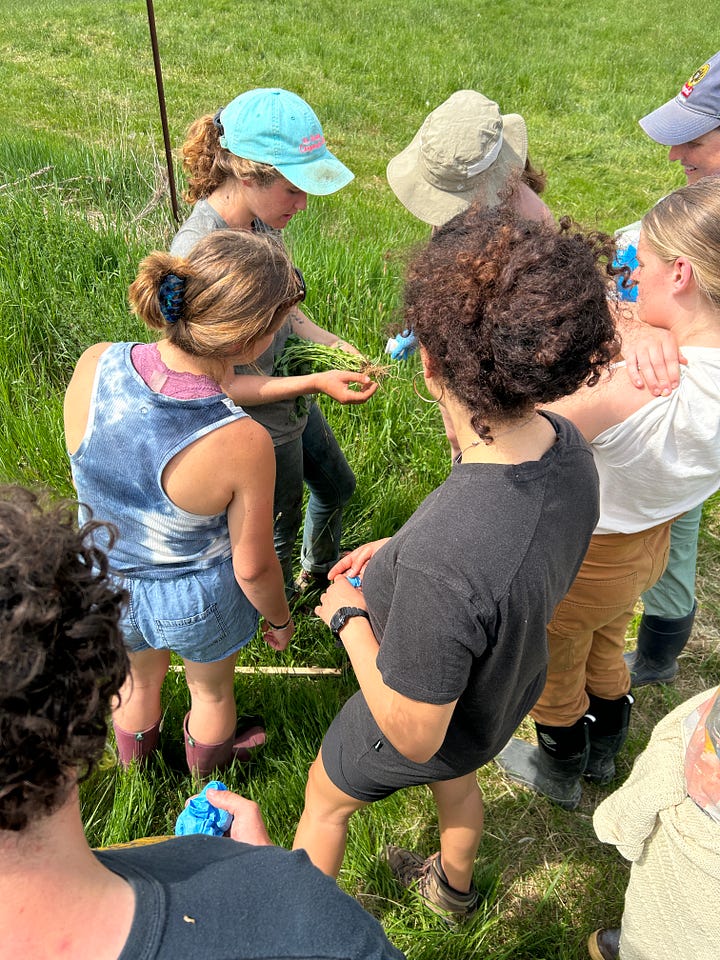
COA official farm webpage: https://www.coa.edu/farms/peggy-rockefeller-farm/
Shopify Store Link: This shows the farm’s current in stock products in the farm store for pre order as well as registration info for events.
Self Serve Farm Store: Accepts cash, check and payments through Shopify. It is open daily from 8 a.m. to 5 p.m. They have eggs and frozen products in there.
For an evolving list of farms and farm stands in the area, check out our post on Acadia Adventures.
Upcoming Events at the Farm:
Ag Allies Field Walk and Talk With Laura Lecker
Event Details:
8 a.m.-10 a.m., Friday, July 11 2025
Peggy Rockefeller Farm Delaittre Fields 660 Norway Drive Bar Harbor Maine
*Limit 20 participants, registration required. Sliding Scale Ticket Pricing Options**
Join us for a presentation and field walk with Ag Allies founder and program director Laura Lecker and Peggy Rockefeller Farm Manager April Nugent to discuss the Ag Allies program and Maine's threatened grassland bird species. This interactive presentation will allow participants to join Laura and her colleagues for a field walk through some of the Delaittre Fields of Peggy Rockefeller Farm to observe a variety of species in action on our program sites. Species they may be spotted include bobolinks, savanna sparrows, two species of swallows, northern harrier hawk and much more.
Organic Poultry Processing Workshops
Event Details: Saturday August 2nd
8 a.m.- 2 p.m.
Registration deadlines is July 20.
Description:
Learn how to safely and humanely harvest chickens and prepare them for cold storage or cooking.
In this on-farm workshop we will review the safety and cleaning protocols of the Maine 1000-bird exemption processing license, talk about humane slaughtering and handling techniques, and work through processing whole organic birds through scalding, plucking, evisceration and bagging. Participants will work with farm staff in our licensed on farm slaughter facility to process chickens from live birds to bagged whole carcasses. Each participant will go home with a fresh whole organic chicken.
Light refreshments and restrooms provided. Participants should arrive wearing closed-toe waterproof shoes (ideally boots), long pants, clothes you don't mind getting messy, and layers appropriate to the weather. Please bring water and a bagged lunch.
Workshop fees are on a sliding scale. We hope this scale will enable all who are interested to attend. For this model to work, we ask you to take into consideration your income and family resources when you choose your registration type. Fees:
Contributing neighbor: $90
Above median income/wealth: $85
Well below median income/wealth: $70
Pre-registration is required! There are only 6 spots available per session and registration is on a first-come, first-serve basis. Re. Ages 18+. For more information or to register, email anugent@coa.edu or call 207-610-0552.
Correction/update: We originally had this information from past news sources and COA (The Cameron family farmed the land as Fair View Acres Dairy back in the late 1800s. The Delaittre farm at 660 Norway Drive was about hay and cattle and crops.). However, there has been comment that it might not be accurate and that we’re missing Cap Whitney and the Mosley family in our history of the prior ownership of the land. Because of this, we’re taking those sentences out and we’ll update the article with more encompassing information once we have a chance to research more.
Follow us on Facebook. And as a reminder, you can easily view all our past stories and press releases here.
If you’d like to donate to help support us, you can, but no pressure! Just click here (about how you can give) or here (a direct link), which is the same as the button below.
If you’d like to sponsor the Bar Harbor Story, you can! Learn more here.





